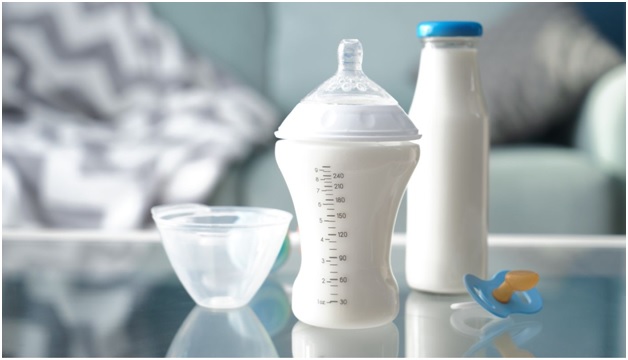The best food for babies under 6 months of age is their mother’s milk. It has a full range of essential substances, vitamins, and minerals for harmonious growth. All the substances in breast milk are chosen by nature in such a way that the baby can easily digest food and absorb as many nutrients from it as possible. In addition, mother’s milk contains a set of enzymes that help the baby’s immature digestive system digest food without tummy troubles and antibodies that protect the baby from viruses and infections. When there is a problem with mother’s milk, you can choose Organic Goat milk formula.


Benefits of using goat milk formulas
Goat milk is traditionally believed to be much healthier than cow’s milk. Many may recall a situation from childhood when, during illness, their grandmother or mother fed them goat milk, counting on the fact that they would soon get better. Let’s find out if goat milk is good for you and what health benefits it has.
Modern research confirms that goat milk has a richer composition of micronutrients, many of which have a higher bioavailability. These features are useful for pregnant and nursing mothers because the composition of breast milk improves. There is also a positive effect on the development of the child.
Let’s consider the benefits in more detail:
- Goat milk is absorbed and digested at a rate similar to that of breast milk. This is in contrast to cow’s milk.
- Goat milk contains special fats called medium-chain triglycerides. Once in the body, they are immediately absorbed into the venous network of the intestine. Cow’s milk, on the other hand, is absorbed with bile because of the lymphatic capillaries, so this product is often more “heavy” for children.
- Goat milk is rich in beneficial natural short- and medium-chain fatty acids and natural oligosaccharides, five of which have been found by modern science to be similar to the oligosaccharides of a mother’s breast milk.
- It contains 1.5 times more iron, which, like calcium, has a higher digestibility. In addition, the product is rich in zinc, selenium, and vitamins C, E, and A, which play an important role in the development of the baby’s immune system.
- Due to the absence of alpha-S 1-casein and gamma-casein proteins, goat milk, although not completely hypoallergenic, is easier to digest for lactose-sensitive children.
- Goats are extremely clean animals; they are more demanding in terms of housing conditions and feed quality, which makes their milk tender and pleasant to taste.
Disadvantages of using goat milk formulas
- Despite the fact that goat’s milk has four times more proteins than a woman’s milk—and proteins, as we all know, are the basic material for a baby’s growth—they are much harder for a baby to digest and can cause bloating and colic.
- In addition, 2–6% of children may have an allergic reaction to one or more milk proteins, and if your baby is allergic to cow’s milk proteins, it means that goat, mare, sheep, or any other milk is not suitable for her diet. This is the most common type of food allergy in newborns. Most children’s allergies, however, fade or disappear within the first three years of life.
- Goat’s milk, like cow’s milk, contains almost no taurine, a very important amino acid for your baby. Babies need it in the first few months after birth so that their brain and bone marrow continue to form properly, and it is also necessary for acute vision in the future.
- Goat milk contains more fat than mommy’s breast milk. At the same time, the percentage of polyunsaturated fatty acids, vital to your little champion for the proper development of the nervous system and retina, as well as the proper development of cognitive functions, is five times lower, and they also have significantly fewer carbohydrates, which are the main source of energy for the active growth and development of children at this age.
- And, despite the fact that goat’s milk contains 4 times more minerals: 2 times more phosphorus, 3–4 times more sodium, and 4 times more calcium, a baby cannot fully assimilate the minerals in it. In addition, this imbalance of minerals can contribute to the fact that the growing body has an excess of some and a lack of other vitamins and minerals.
- Especially dangerous for children under a year old is the lack of iron, which is not enough in goat milk. Iron plays an important role in metabolic processes and the normal development of the circulatory system during the active growth period of babies.
So, there are pros and cons to the use of goat’s milk, but it is clear that for young children, milk—even goat’s milk—is too complex a product that cannot be assimilated to the fullest extent. Any milk requires adaptation to a child’s still imperfect digestive system.
That is why it is ideal to start using goat milk-based baby formula instead of whole milk. This is a gentle option for introducing a new diet to the baby’s diet. Goat’s milk-based baby formulas do not lose the beneficial properties of the live product, but adapt them to the child’s needs and promote proper absorption of vitamins and minerals.
Baby food based on goat’s milk forms a softer clot in the baby’s stomach, easing constipation, which is a frequent problem when giving up breastfeeding.
Based on the foregoing, we can conclude that providing a comprehensive and healthy diet is essential for children’s health and the development of wholesomeness. And if there is no opportunity to breastfeed, you can choose the best analogue.
























